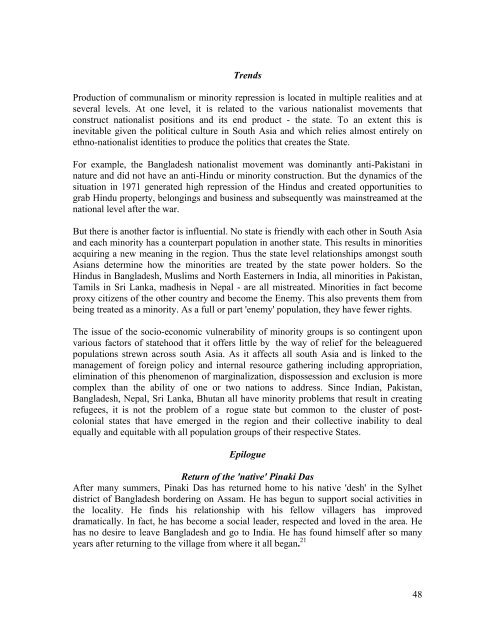Living on the Margins. Minorities in South Asia - EURAC
Living on the Margins. Minorities in South Asia - EURAC
Living on the Margins. Minorities in South Asia - EURAC
- TAGS
- minorities
- eurac
- www.eurac.edu
Create successful ePaper yourself
Turn your PDF publications into a flip-book with our unique Google optimized e-Paper software.
Trends<br />
Producti<strong>on</strong> of communalism or m<strong>in</strong>ority repressi<strong>on</strong> is located <strong>in</strong> multiple realities and at<br />
several levels. At <strong>on</strong>e level, it is related to <strong>the</strong> various nati<strong>on</strong>alist movements that<br />
c<strong>on</strong>struct nati<strong>on</strong>alist positi<strong>on</strong>s and its end product - <strong>the</strong> state. To an extent this is<br />
<strong>in</strong>evitable given <strong>the</strong> political culture <strong>in</strong> <strong>South</strong> <strong>Asia</strong> and which relies almost entirely <strong>on</strong><br />
ethno-nati<strong>on</strong>alist identities to produce <strong>the</strong> politics that creates <strong>the</strong> State.<br />
For example, <strong>the</strong> Bangladesh nati<strong>on</strong>alist movement was dom<strong>in</strong>antly anti-Pakistani <strong>in</strong><br />
nature and did not have an anti-H<strong>in</strong>du or m<strong>in</strong>ority c<strong>on</strong>structi<strong>on</strong>. But <strong>the</strong> dynamics of <strong>the</strong><br />
situati<strong>on</strong> <strong>in</strong> 1971 generated high repressi<strong>on</strong> of <strong>the</strong> H<strong>in</strong>dus and created opportunities to<br />
grab H<strong>in</strong>du property, bel<strong>on</strong>g<strong>in</strong>gs and bus<strong>in</strong>ess and subsequently was ma<strong>in</strong>streamed at <strong>the</strong><br />
nati<strong>on</strong>al level after <strong>the</strong> war.<br />
But <strong>the</strong>re is ano<strong>the</strong>r factor is <strong>in</strong>fluential. No state is friendly with each o<strong>the</strong>r <strong>in</strong> <strong>South</strong> <strong>Asia</strong><br />
and each m<strong>in</strong>ority has a counterpart populati<strong>on</strong> <strong>in</strong> ano<strong>the</strong>r state. This results <strong>in</strong> m<strong>in</strong>orities<br />
acquir<strong>in</strong>g a new mean<strong>in</strong>g <strong>in</strong> <strong>the</strong> regi<strong>on</strong>. Thus <strong>the</strong> state level relati<strong>on</strong>ships am<strong>on</strong>gst south<br />
<strong>Asia</strong>ns determ<strong>in</strong>e how <strong>the</strong> m<strong>in</strong>orities are treated by <strong>the</strong> state power holders. So <strong>the</strong><br />
H<strong>in</strong>dus <strong>in</strong> Bangladesh, Muslims and North Easterners <strong>in</strong> India, all m<strong>in</strong>orities <strong>in</strong> Pakistan,<br />
Tamils <strong>in</strong> Sri Lanka, madhesis <strong>in</strong> Nepal - are all mistreated. <strong>M<strong>in</strong>orities</strong> <strong>in</strong> fact become<br />
proxy citizens of <strong>the</strong> o<strong>the</strong>r country and become <strong>the</strong> Enemy. This also prevents <strong>the</strong>m from<br />
be<strong>in</strong>g treated as a m<strong>in</strong>ority. As a full or part 'enemy' populati<strong>on</strong>, <strong>the</strong>y have fewer rights.<br />
The issue of <strong>the</strong> socio-ec<strong>on</strong>omic vulnerability of m<strong>in</strong>ority groups is so c<strong>on</strong>t<strong>in</strong>gent up<strong>on</strong><br />
various factors of statehood that it offers little by <strong>the</strong> way of relief for <strong>the</strong> beleaguered<br />
populati<strong>on</strong>s strewn across south <strong>Asia</strong>. As it affects all south <strong>Asia</strong> and is l<strong>in</strong>ked to <strong>the</strong><br />
management of foreign policy and <strong>in</strong>ternal resource ga<strong>the</strong>r<strong>in</strong>g <strong>in</strong>clud<strong>in</strong>g appropriati<strong>on</strong>,<br />
elim<strong>in</strong>ati<strong>on</strong> of this phenomen<strong>on</strong> of marg<strong>in</strong>alizati<strong>on</strong>, dispossessi<strong>on</strong> and exclusi<strong>on</strong> is more<br />
complex than <strong>the</strong> ability of <strong>on</strong>e or two nati<strong>on</strong>s to address. S<strong>in</strong>ce Indian, Pakistan,<br />
Bangladesh, Nepal, Sri Lanka, Bhutan all have m<strong>in</strong>ority problems that result <strong>in</strong> creat<strong>in</strong>g<br />
refugees, it is not <strong>the</strong> problem of a rogue state but comm<strong>on</strong> to <strong>the</strong> cluster of postcol<strong>on</strong>ial<br />
states that have emerged <strong>in</strong> <strong>the</strong> regi<strong>on</strong> and <strong>the</strong>ir collective <strong>in</strong>ability to deal<br />
equally and equitable with all populati<strong>on</strong> groups of <strong>the</strong>ir respective States.<br />
Epilogue<br />
Return of <strong>the</strong> 'native' P<strong>in</strong>aki Das<br />
After many summers, P<strong>in</strong>aki Das has returned home to his native 'desh' <strong>in</strong> <strong>the</strong> Sylhet<br />
district of Bangladesh border<strong>in</strong>g <strong>on</strong> Assam. He has begun to support social activities <strong>in</strong><br />
<strong>the</strong> locality. He f<strong>in</strong>ds his relati<strong>on</strong>ship with his fellow villagers has improved<br />
dramatically. In fact, he has become a social leader, respected and loved <strong>in</strong> <strong>the</strong> area. He<br />
has no desire to leave Bangladesh and go to India. He has found himself after so many<br />
years after return<strong>in</strong>g to <strong>the</strong> village from where it all began. 21<br />
48

















